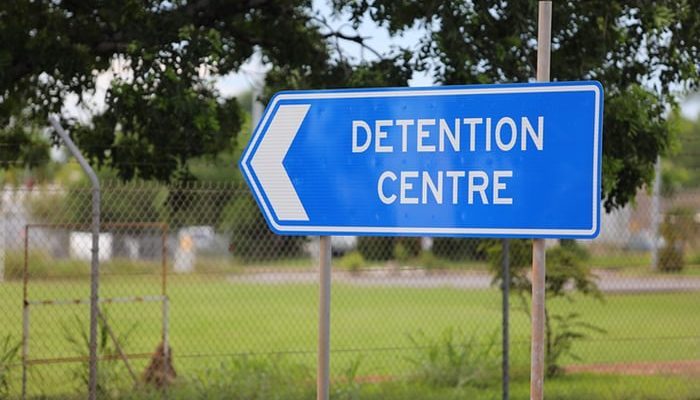Gerry Georgatos calls for the same level of education for inmates in prison as is available on the outside
Almost no Aboriginal and Torres Strait Islander prisoners have completed year 12, a leading researcher has said, calling for an overhaul of education inside correctional facilities.
The Northern Territory has launched an Aboriginal justice unit, tasked with leading “a total cultural shift” within the NT justice system and creating a formal justice agreement with Indigenous communities.
Gerry Georgatos, a restorative justice and prison reform expert, told Guardian Australia reform was “on the horizon” but governments needed to commit to providing the same level of education for inmates as was available on the outside.
The rates of high-school completion are low among all Australian prisoners, but are even lower among Aboriginal and Torres Strait Islander people – who are already vastly overrepresented in jails. Georgatos, who works closely with prisoners across Australian facilities, said in his experience close to 100% of Indigenous inmates had not finished year 12.
“I visited one Perth-based prison in WA and spoke to 15 Aboriginal and Torres Strait Islander prisoners who were nearing release in the next four to 12 weeks,” Georgatos said. “All 15 had not completed year 12, and half had not been to high school. Half a dozen had significant literacy issues.”
A 2015 study by the Australian Institute for Health and Welfare found only 38% of prison entrants surveyed had attained year 11 or 12. Just 20% of Indigenous entrants had completed the same level of education, and Indigenous dischargees – outside of New South Wales – were more than twice as likely as non-Indigenous counterparts to have only reached year 8 or below.
Studies have linked education with reduced rates of recidivism, a social return Georgatos suggested, alongside increased post-release employment, would offset the cost of increased educational programs.
“The way forward is to get people as many qualifications as they possibly can, and that starts with completing primary school and completing high school if they’re in juvenile detention,” said Georgatos.
Georgatos said his concerns applied equally to juvenile and adult incarceration, and the systems needed a “radical” overhaul.
“Conversations and policy making at the government level are substantive, but they need to be much more substantive. It must be the equivalent to what’s on the outside.”
Earlier this year the royal commission into the protection and detention of children heard from teachers and managers at Northern Territory juvenile detention centre schools.
All noted that the transitional nature of the detention population made determining and providing individual lesson plans difficult, and the large proportion of children who were on remand also made it “an uncertain time”.
“We don’t know whether they’re fit for school or if they’re able to function properly in the classroom. We don’t know their literacy or numeracy academic levels so we need to assess them as soon as possible,” said David Glyde, a teacher at Alice Springs detention centre.
Georgatos said that didn’t matter. “In that window of time while they’re in juvenile detention, no matter how short or long, what’s on offer on the outside should be on the inside,” he said. “That way we have a minimisation of disruption to educational content.”
Georgatos’s call for educational investment coincided with territory’s official launch of an Aboriginal justice unit within the Attorney General’s Department.
The six-member unit is tasked with spending the next year consulting on incarceration and other justice issues with Indigenous groups and communities in order to create an Aboriginal justice agreement.
More than 85% of the NT’s prison population identify as Indigenous.
The NT attorney general, Natasha Fyles, promised the unit would look at “practical solutions” and empower communities as part of the government’s pledge to return decision-making powers to Indigenous people.
“We would like to see a justice system that acknowledges Aboriginal Territorians, acknowledges culture, acknowledges language, and provides for that in delivering a fair equitable justice system for all Territorians.”
Fyles said the unit would examine in-depth, long-term measures, including what was offered within correctional facilities, alternatives to prison, and support for people on remand.
Asked about calls to scrap mandatory sentencing, Fyles said it would be “looked at” by the government.
The director of the unit, Leanne Liddle, said its establishment showed “a total shift of culture of the government”.
She said reducing recidivism and incarceration rates were just part of the unit’s goals.
“We want to embrace Aboriginal people’s leadership styles, we want to make sure that Aboriginal people are heard, that there is local decision-making, and embed that all within a culturally competent framework in the justice agreement.”
She said Indigenous leadership in communities was strong and “they want this change to happen”.
“They want safer communities.”
She said it couldn’t be looked at as a justice issue alone, and the unit would work across departments, including health and housing.
Sam Bowden, a spokeswoman for the Making Justice Work campaign, welcomed the announcement, which responded to one of the organisation’s six pre-election “asks”.
Bowden said the challenge for the government would be to back it up with thorough consultations “and by creating a culture … where conversations about how the justice system and Aboriginal people interact can happen.”

